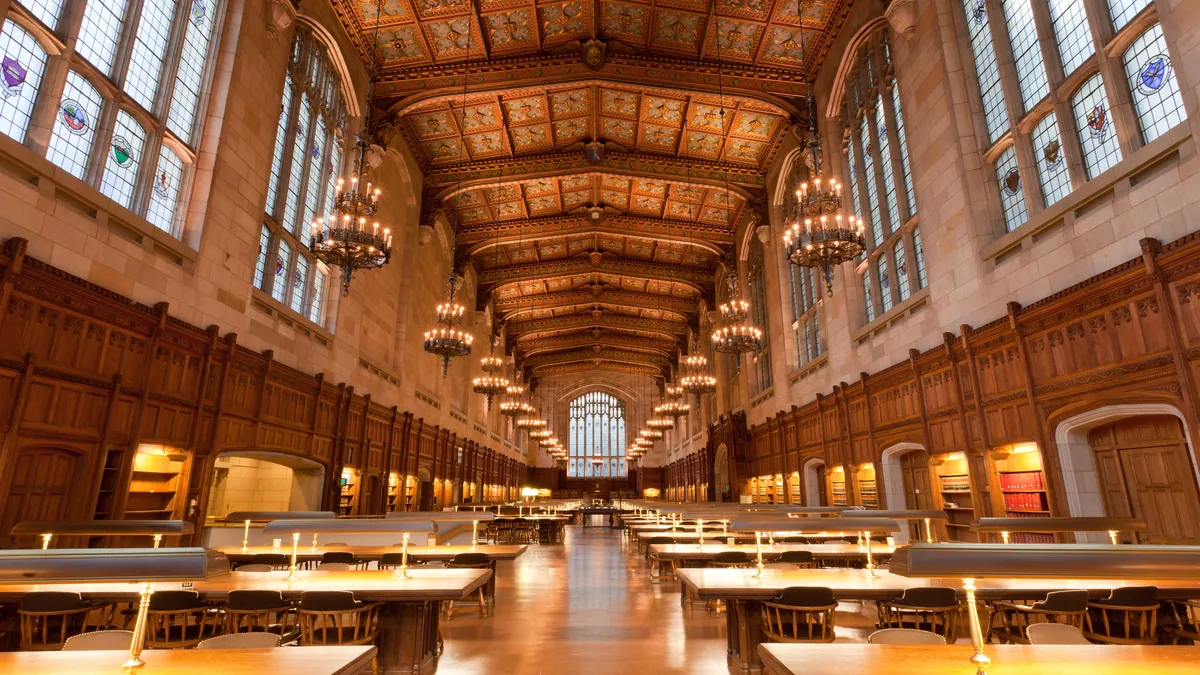Dive Brief:
- At least two more law schools backed away from U.S. News & World Report’s Best Law Schools rankings over the weekend, as Stanford Law said Friday it is withdrawing, and Michigan Law said Sunday it won't participate. Then Monday, Duke Law and Northwestern University’s law school joined the exodus.
- Michigan Law Dean Mark West credited Yale University's dean, Heather Gerken, for being first among a string of top law schools' leaders by saying Wednesday the institution will not participate in the rankings amid concerns their methodology discourages support for public-interest careers and low-income students. "Although we have had sustained discussion for years within the Quad about parting ways with the rankings, it would have been difficult for us to take this step alone," West wrote in a public letter.
- Stanford pulled out in hopes of encouraging U.S. News to overhaul its methodology. Its dean, Jenny Martinez, called for "clearer and more relevant information" that students will find useful.
Dive Insight:
Yale Law School said Wednesday it will stop taking part in U.S. News' list. Its dean, Gerken, sharply criticized the rankings for discouraging law schools from promoting public-interest careers and advanced degrees.
Harvard Law joined in that same day, meaning two of the list's top-ranked institutions had repudiated it — Yale is No. 1, while Harvard is tied with Columbia University's law school at No. 4.
Other top-ranked institutions soon followed. The University of California, Berkeley dropped out Thursday, taking out the ninth-ranked institution. Columbia Law School did so Friday, as did Georgetown Law, ranked No. 14.
Stanford adds the No. 2 law school to the list of those stepping away, while Michigan adds No. 10. Duke is No. 11, and Northwestern is No. 13. Together, they mean at least nine of U.S. News' top 15 law schools have now told the publication they won't send data for the list.
U.S. News has promised to keep ranking all accredited law schools in the country, regardless of whether they submit data. The publication respects law schools' decision not to submit information, but it will keep providing comparative information for students, its chief data strategist, Robert Morse, wrote Thursday.
Michigan Law's dean, West, acknowledged in his letter that U.S. News and other publications can continue ranking law schools regardless of whether the institutions participate.
Those at Michigan Law were not dissuaded.
"No matter," West wrote. "We will continue to focus on providing the best legal education possible and supporting our community — including especially the people-centric factors that rankings struggle to measure."
West blasted the U.S. News rankings as opaque. The publication doesn't make public much of the data that feeds its list, West wrote. Changes to ranking methodology are often announced after they're made or are never explained, and U.S. News "neither vets nor authenticates the data," according to West.
West called that situation inequitable and, at worst, "an unregulated opportunity for manipulation."
Stanford Law's dean, Martinez, maintained the institution does not allow its behavior to be substantially affected by rankings. But its leaders agree with others who worry the rankings distort schools' incentives, hurting the whole of legal education.
Still, Martinez was not ready to repudiate the idea of law school lists.
"We know that well-formulated rankings, along with other publicly available data, can provide a valuable service to prospective students," Martinez wrote. "In the spirit of providing useful information to prospective students and improving the ability of law schools to do their best for students, we have been one of a number of law schools who have approached US News over time with concrete suggestions to improve its ranking methodology, to no avail."
The law schools' decisions mark a sharp escalation in decades of complaints about U.S. News and the college rankings industry. Many colleges publicly tout their ranking each year, even as some presidents privately gripe about perverse pressures the lists place on their behavior. A handful of colleges have stopped taking part in the lists or threatened to do so.
It's not entirely clear what new admissions vision would take shape if college rankings were to suddenly collapse — and worries persist that alternatives would not be substantially better for students.
Washington Post columnist Megan McArdle wrote Sunday that "the alternative to rankings is not some ideal world where every prospective student does deep, holistic research on every school they’re applying to, carefully weighing job placement prospects, cultural fit, faculty research profiles and so forth. The alternative is people going by the relative prestige of the school name, plus recruiting materials that might not (probably won’t?) give students anything like the full story."















